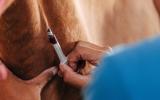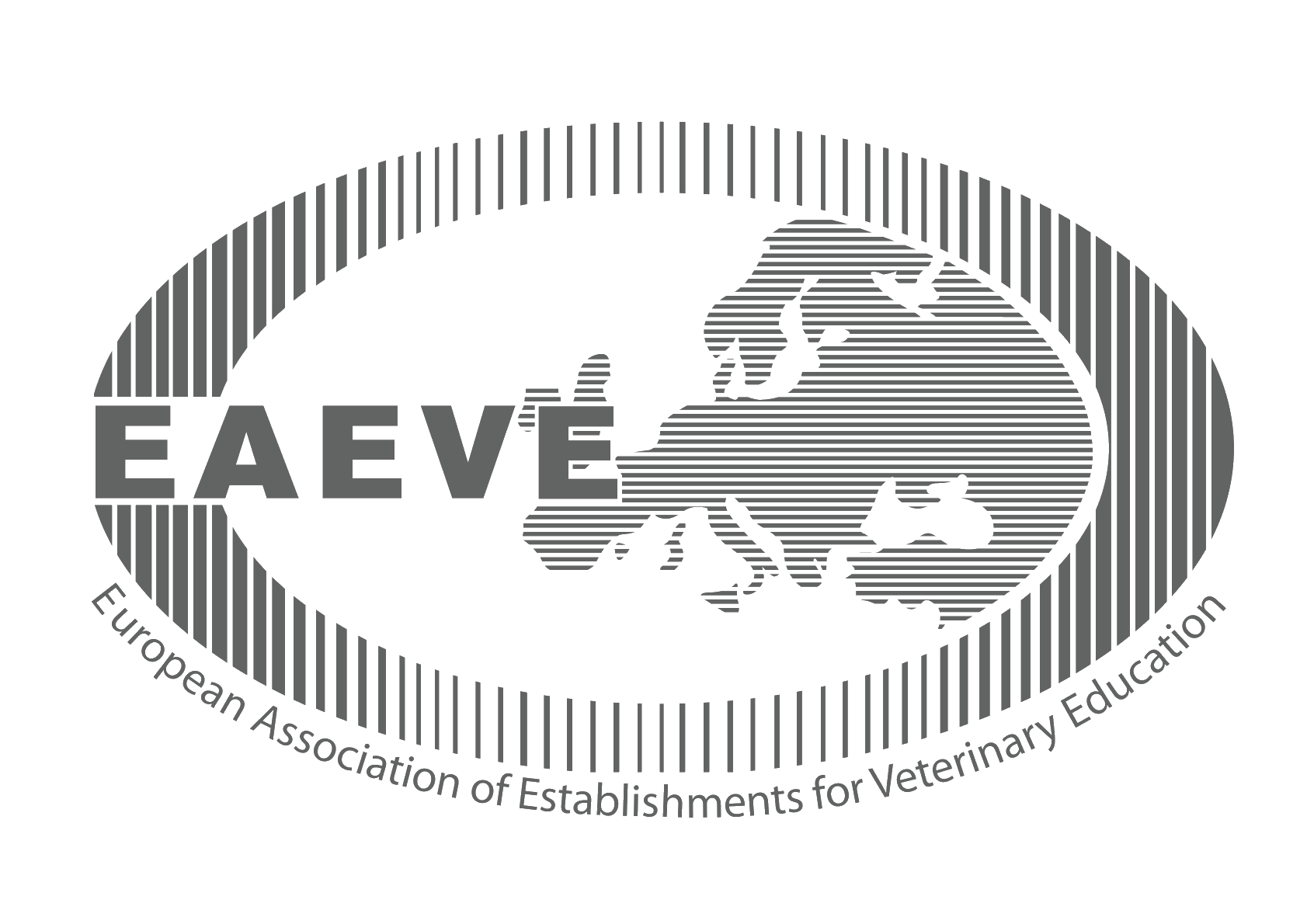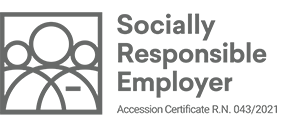The basic objective of the programme is to acquire the medical/veterinary skills necessary to independently solve professional problems in the fields of disease prevention, veterinary public health, safe food, environmental protection and treatment of animals.

Undergraduate Studies
Programme overview
The level 2 single cycle Master’s degree study programme in veterinary medicine lasts 6 years (12 semesters) and comprises a total of 360 credit points. In the final year, students enrol mainly in elective courses and complete clinical and professional practice.
The graduate obtains the title of Doctor of Veterinary Medicine (DVM).
Ensuring quality
The Faculty of Veterinary Medicine is a positively evaluated faculty of veterinary medicine in the European area and enables employment of our graduates across Europe.
On September 29, 2021, the Veterinary Faculty of the University of Ljubljana received the status of EAEVE-accredited faculty for the next seven years.
Read More
Objectives and competences
According to EU directives, a veterinarian must be qualified to perform all veterinary activities at the end of their studies.
This means that during the period of study, students must be acquainted with all the theoretical bases and practical procedures that provide them with this knowledge. Veterinarians must therefore be prepared for all methods of work, from the treatment of small and large animals to the sanitary inspection of meat and food in food industry establishments. The basic goal of the programme is to acquire the medical and veterinary knowledge necessary to independently solve problems in the following areas of the profession:
- preventing the onset and spread, and thus the eradication of infectious animal diseases
- preventing the transmission of infectious diseases that are dangerous to animals and humans
- veterinary public health
- the production and processing of safe food, especially that of animal origin
- the treatment, protection and welfare of non-domestic and domestic species of animals
- environmental protection from a veterinary point of view
- ability to analyse, connect and solve problems
- ability to make decisions in professional work
- awareness of ethical, moral and material responsibility
- ability to organise and plan
- knowledge of research methods and their applicability in work
- ability to work in teams
- ability to communicate and cooperate with users and other professions
- ability to communicate verbally both in their mother tongue and foreign languages
- information management (information technology, obtaining information from various sources, e.g. textbooks, articles, the internet, etc.)
The training of veterinarians in accordance with Directive 2005/36/EU on the recognition of professional qualifications and its amendment 2013/55/EU ensures that the professional acquires the following competencies:
- adequate knowledge of the sciences on which the activities of veterinarians are based and the EU law applicable to those activities
- adequate knowledge of the structure, functions, behaviour and physiological needs of animals in relation to animal husbandry, feeding, welfare, reproduction and general hygiene
- clinical, epidemiological and analytical competencies for the prevention, diagnosis and treatment of animal diseases, including anaesthesia, aseptic surgery and putting animals to sleep in a humane way, both for individuals and groups of animals, including specific knowledge of human-communicable diseases
- appropriate competencies in preventive medicine, including those related to investigations and providing certifications
- adequate knowledge of the hygiene and technology of obtaining, producing and marketing animal feed or food of animal origin intended for human consumption, including the competencies needed to understand and explain good practice in this field
- competencies necessary for the responsible and reasonable handling of veterinary medicinal products used for the treatment of animals and ensuring the safety of the food chain and protection of the environment
Conditions for enrolment and eligibility criteria
The following may enrol in the single cycle Master's degree programme in veterinary medicine:
Anyone who has passed the general secondary school leaving examination may enrol in the single cycle Master's study programme in Veterinary Medicine.
In the event of restricted enrolment, candidates will be selected based on:
- general success in the general secondary school leaving examination (60% of points)
- overall success in the 3rd and 4th years (30% of points)
- success in one of the science subjects in the general secondary school leaving examination (physics, chemistry, biology) (10% of points)
Anyone who has passed the vocational secondary school leaving examination in the secondary school veterinary technician programme and the secondary school examination in the subject of chemistry may enrol in the single cycle Master's study programme in Veterinary Medicine. If the candidate has already taken this subject as part of the vocational secondary school leaving examination, an examination in biology or physics will suffice. The chosen subject may not be a subject that the candidate has already passed as part of the vocational secondary school leaving examination.
In the event of restricted enrolment, candidates will be selected based on:
- overall success in the 3rd and 4th year (40% of points)
- general success in the vocational secondary school leaving examination (40% of points)
- success in the subject in the vocational secondary school leaving examination (20% of points)
Anyone who has completed any four-year secondary school programme prior to 1 June 1995 may enrol in the single cycle Master's study programme in Veterinary Medicine.
In the event of restricted enrolment, candidates will be selected based on:
- success in physics, chemistry and biology in the final exam or in the final year of secondary school when the subject was taught (40% of points)
- overall success in the 3rd and 4th year (40% points)
- overall success in the final exam (20% of points)
Vaccination against tick-borne meningoencephalitis and rabies in Year 1 is a further mandatory condition for enrolment (Rules on vaccination and protection using medicine and protection against the introduction and spread of infectious diseases).
Selected applicants must provide a medical certificate from a specialist in occupational medicine stating that they are medically fit to perform the work and duties of a Doctor of Veterinary Medicine.
Criteria for recognition of knowledge and skills acquired prior to enrolment in the programme
Knowledge and skills acquired prior to enrolment in the programme are not considered as a prerequisite for enrolment and a selection criterion upon restriction of enrolment, however, they may be considered as completed study requirements. Decisions on recognition are made in accordance with the University Rules on the Procedure and Criteria for Recognition of Non-Formally Acquired Knowledge and Skills, and by the Student Affairs Commission on the basis of each individual candidate’s application.
Assessment methods
Assessment methods are in accordance with the University of Ljubljana Statute and are specified in the curricula.
Conditions for progression in the programme
To enrol in a higher year, students must have a confirmed previous year with attendance records of all subjects and completed exercises of that year.
Vaccination is mandatory, which is based on the Rules on vaccination and protection using medicine and protection against the introduction and spread of infectious diseases, Official Act of the Republic of Slovenia, No.16/99, 58/01, 50/05 in 92/06.
In order to advance to a higher year, students must have fulfilled the obligations in the following scope of the credit points (for retakes, at least half of the credit points required for enrolment in the higher year are required):
- In order to progress from Year 1 to Year 2 students must fulfill obligations amounting to 57 credit points; for re-enrolment in the year, 29 European credit system (ECTS) points are required.
- In order to progress from Year 2 to Year 3 students must fulfill all the obligations of the first year and achieve 57 credit points from Year 2; for re-enrolment in the year 29 ECTS points are required.
- In order to progress from Year 3 to Year 4 students must fulfill all the obligations of Year 2 and achieve 54 credit points from Year 3; for re-enrolment in the year 27 ECTS points are required.
- In order to progress from Year 4 to Year 5 students must complete all the obligations of Year 3 and achieve 50 credit points from Year 4; for re-enrolment in the year 25 ECTS points are required.
- In order to progress from Year 5 to Year 6 students must complete all the obligations of Year 4 and achieve 45 ECTS points from Year 5; for re-enrolment in the year 23 ECTS points are required.
Re-enrolled students and those who do not have the status of a student in a certain year must complete all the prescribed obligations of the previous year (60 ECTS) in order to enrol in a higher year.
Sequence of exams:
- The examination in the subject Cell Biology must be passed prior to the examination in the subject Histology with Embryology 1.
- The Examination in Histology with Embryology 2 must be passed prior to the examination in Veterinary Physiology.
All compulsory and elective courses must be completed prior to the final examination in Administrative and Forensic Veterinary Medicine.
Students who do not meet the requirements for enrolment in a higher year may re-enrol in the same year once during the period of study provided they have achieved at least half of the ECTS points required for enrolment in the higher year.
The dean or deputy dean for pedagogical activity may also exceptionally authorise re-enrolment for students who do not qualify for re-enrolment if they have failed to fulfill the prescribed obligations for justifiable reasons, such as:
- prolonged absence due to illness and medical treatment
- childbirth
- difficult social conditions
In such cases, students must submit the relevant supporting documents.
For guidance during study, students can contact the department for education, research and international cooperation, year tutors, the Student Affairs Committee, the Vice-Dean for Pedagogical activity, and the Dean of the Faculty of Veterinary Medicine.
Conditions for transitions between programmes
Transitions between the programmes of the Faculty of Veterinary Medicine submitted by individual candidates are discussed by the Commission for Student Affairs, which defines the conditions for continuation of study on the basis of study obligations.
The transition from an old to a new, or to a renewed, study programme is possible provided that the requirements and obligations of the new programme have been fulfilled. The Student Affairs Commission, in accordance with the conditions for transitions between study programmes, (Official Act 45/94 and 78/98), as defined in the Statute of the University of Ljubljana, and pursuant to Article 39 of the Higher Education Act , determine the obligations that students must fulfill and the year in which they can enrol.
Requirements for completion of studies
Students complete their studies following the completion of all obligations totalling 360 ECTS points.
Assessment of subjects with credit points
For all study units (subjects), except for clinical practice and three-month professional practice, credit points (ECTS or credit point) are calculated on the basis of the formula:
ECTS = SOŠ/30
SOŠ=ŠPČ+CH
ECTS - European Credit Transfer System
SOŠ - skupna obremenitev študenta
OW - Own work
CH - contact hours
Contact hours are hours that a student spends at the faculty in contact with the course providers, or with mentors of clinical or practical classes in clinical and professional practice.
Students’ preparation time is obtained on the basis of a survey in which students estimated how much time they need to fulfil the obligations of the course (independent study, colloquia, seminars, etc.). Contact hours are added to this from which the total student workload is obtained, which is divided by 30 based on the number of hours for one credit point (ECTS).
Curriculum
The emphasis is on basic subjects such as anatomy, biochemistry, genetics, and cell and tissue structure, however, students also learn about breeding, nutrition, and animal breeds. They learn about animal husbandry methods during field exercises.
Read More
Students become acquainted with the functioning of the body (physiology), microbiology, parasitology and pathology. They also begin to learn about animal welfare and ethics and regulations in this area. At this stage they are beginning to develop an awareness of providing a safe food chain.
Read More
Subjects begin in which students learn about pathological processes in the body, the causes of death and the action of drugs. They learn how to approach animals, clinical examinations of animals, and the basics of surgery. They also learn the basics of food hygiene (safe food) and procedures for disinfection and protection of the environment in which animals live.
Read More
Students learn about the reproduction and obstetrics of domestic animals. Clinical subjects begin in which diseases, treatments, and measures are learned in various animal species (equidae, ruminants, game, fish, and bees). Students work in a slaughterhouse and learn veterinary sanitation.
Read More
Clinical subjects (poultry, dogs, cats, exotic animals) continue, while knowledge of laws, other regulations and procedures that a veterinarian must follow in their work is added. In addition, students work in laboratories to test the suitability of foods of animal origin.
Read More
The emphasis is on practical training (clinical rotations) in all areas of veterinary activities. By choosing six elective courses, students can deepen their knowledge in the area in which they will be employed.
Read More
Tutoring
Tutoring is carried out by teacher tutors - representatives of each study year appointed by the Commission for Study and Student Affairs, as well as student tutors appointed by the Student Council:
- for introductory tutoring
- for the tutor of each study year
- for subject tutoring
- for tutoring students from abroad
The tutoring system at the Faculty of Veterinary Medicine is run by the teacher tutor coordinator and the student tutor coordinator.
Managing study and student affairs
Students may manage study documentation during office hours in the Department for Undergraduate Studies.
Content issues related to studies and all other study or student matters can be managed by students with teacher tutors and student tutors, and further within the student council, year councils, student assembly, student organisation, through student representatives in faculty bodies, especially with the Commission for Study and Student Affairs, as well as with the vice dean for pedagogical activity and the dean of the faculty.
International exchange of students and teachers
The Faculty of Veterinary Medicine provides veterinary students and employees with various forms of exchange within the framework of international mobility programmes.
Read More
Library and reading room
The faculty has a well-equipped library and reading room located at Cesta v Mestni log 47. In the library, students have the opportunity to browse global bibliographic databases in the field of veterinary medicine and other related professional fields.
Opening hours
| Mondays - Wednesdays | 7am – 6pm |
| Thursdays and Fridays | 7am – 3pm |
| From June to September | 7am – 3pm |
| Saturdays, Sundays and public holidays | Closed |
Read More
Other information for students
Price list of contributions and services
Presentation brochure
Contact Details
Department for Undergraduate Studies
Address |
Gerbičeva 60, SI-1000 Ljubljana | |
Phone |
01 4779 105 01 4779 104 |
|
Fax |
01 283 22 43 (Main Office) | |
|
|
glavna.pisarna@vf.uni-lj.si |
Glavna navigacija
- Informativni dan
- Why to become a veterinarian?
- Undergraduate Studies
- Postgraduate studies
- Pripravništvo
- Summer Schools
- Continuous education
- Professional Development
- International Activity
- Mednarodna dejavnost - Tuji študentje
- The Path to Creative Knowledge
- Tutoring
- Extracurricular Activities
- Career Centres
- Alumni
- Student organizations and societies
- Quality Assurance
Location
Gerbičeva 60
SI-1000 Ljubljana
Slovenija
Sample Reception
Samples are received at several locations throughout Slovenia. See where.
The veterinarian on duty
Emergency veterinary assistance for dogs and cats and a telephone number of constant readiness.
Library
A wide selection of domestic and foreign professional literature in the field of veterinary medicine and other sciences.
Main navigation
-
Education
- Informativni dan
- Why to become a veterinarian?
- Undergraduate Studies
- Postgraduate studies
- Pripravništvo
- Summer Schools
- Continuous education
- Professional Development
- International Activity
- Mednarodna dejavnost - Tuji študentje
- The Path to Creative Knowledge
- Tutoring
- Extracurricular Activities
- Career Centres
- Alumni
- Student organizations and societies
- Quality Assurance
- Clinics
- Diagnostics
- Dobrobit
- NVI
- Research
- About us
- Hub




